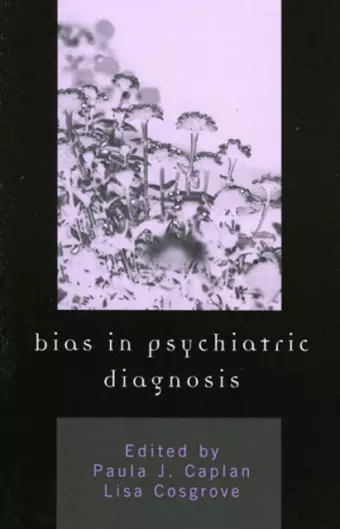Bias in Psychiatric Diagnosis
Paula J Caplan editor Lisa Cosgrove editor
Format:Hardback
Publisher:Jason Aronson Publishers
Published:17th Oct '04
Currently unavailable, and unfortunately no date known when it will be back
This hardback is available in another edition too:
- Paperback£48.00(9780765700018)

The public has a right to know that when they go to a therapist, they are almost certain to be given a psychiatric diagnosis, no matter how mild or normal their problems might be. It is unlikely that they will be told that a diagnosis will be written forever in their chart and that alarming consequences can result solely from having any psychiatric diagnosis. It would be disturbing enough if diagnosis was a thoroughly scientific process, but it is not, and its unscientific nature creates a vacuum into which biases of all kinds can rush.
Bias in Psychiatric Diagnosis is the first book ever published about how gender, race, social class, age, physical disability, and sexual orientation affect the classification of human beings into categories of psychiatric diagnosis. It is surprising that this kind of book is not yet on the market, because it is such a hot topic, and the negative consequences of psychiatric diagnosis range from loss of custody of a child to denial of health insurance and employment to removal of one's right to make decisions about one's legal affairs. It is an unusually compelling book because of its real-life relevance for millions of people. Virtually everyone these days has been a therapy patient or has a loved one who has been. In addition, psychiatric diagnosis and biases in diagnosis are increasingly crucial portions of, or the main subject of, legal proceedings.
This book should sit next to every doctor's PDR, especially given the skyrocketing use of psychoactive drugs in toddlers, children, and adolescents, as well as in adults, and especially because receiving a psychiatric label vastly increases the chances of being prescribed one or more of these drugs.
A Jason Aronson Book
Providing historical and sociological analyses, the contributors demonstrate bias in diagnoses, stemming from sexism, racism, ageism, homophobia/heterosexism, and classism. They argue that awareness of bias is important to any "helping" profession involved with diagnosis and treatment of post-traumatic stress disorder, mental retardation, parental alienation syndrome, learning disabilities, sexual dysfunction, depression, anxiety, schizophrenia, false memory syndrome, agoraphobia, eating disorders, histrionic personality, and menstrual distress. Summing Up: Recommended. * Choice Reviews *
Taken as a whole these collected essays offer an interesting starting point from which to begin a more rigorous inquiry into the problem and ultimately encourage action at both the individual and the professional level. The authors of this text should be congratulated on their worthy attempt to meet this challenge. * PsycCRITIQUES *
The collection is powerful, unique, comprehensive, cogent, sane, balanced, and extremely important. It covers almost every major form of bias and oppression, as well as the profound biases embedded in many individual diagnostic labels. This is a must-read for all mental health professionals and their clients. -- Phyllis Chesler, Ph.D., emerita professor of psychology and women studies at the College of Staten Island (CUNY), author of 12 books, including Women an
This is an extraordinarily important book. It should be required reading for all mental health professionals and especially for all teaching programs. Further, it could serve as an excellent illustration of the social construction of what comes to be called science. It is that and also much more than an intellectual exercise because these issues affect profoundly the fate of so many people. -- Jean Baker Miller, M.D., director of the Jean Baker Miller Training Institute and author of Toward a New Psychology of Women
By unraveling the roles of ideology, socially-constructed norms, and commercial interests in psychiatric diagnosis, this valuable book of original essays helps to explain the meteoric rise in psychotropic drug use and the new social trend of psychopharmaphilia. A book of accessible and stimulating original essays that unravels the complex web of transscientific factors and bias that enter into psychiatric diagnosis. -- Sheldon Krimsky, Tufts University * Planning At Tufts University *
ISBN: 9780765703750
Dimensions: 235mm x 165mm x 24mm
Weight: 517g
304 pages